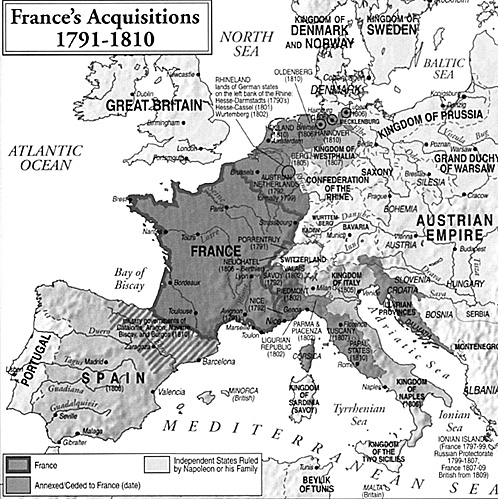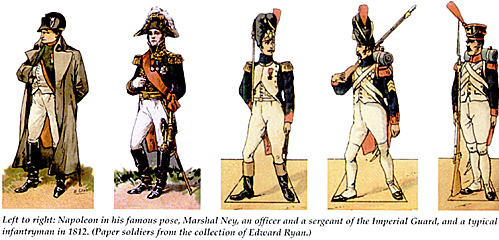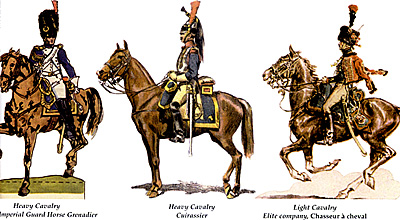
With the execution of Louis XVI in 1793, Republican France was governed by a bloody succession of conventions, committees, and directories. The coup d'etat of Brumaire (November 1799) marked the beginning of the Consular period and Napoleon Bonaparte's accession to national power as First Consul. With his crowning as Emperor in 1804, he became the undisputed ruler of France and its satellites. For a man who believed in destiny, the Fates certainly appeared to be on his side.
France's financial disarray provided one of the initial impulses of revolution, and financial imperatives continued to haunt Republican and, to a lesser extent, Napoleon's Imperial strategy in a fashion perhaps best characterized by the adage of making war pay for war by taking it outside France's borders. Enforced foreign contributions to France served to encourage the notoriously acquisitive nature of a number of its generals (such as Massena), and the French military habit of living off the country reflected an opportunity for the lower ranks to share in the spoils.
The failure to overcome Britain's naval power resulted in the loss of France's overseas colonies and their revenues and commodities. One momentous consequence was Napoleon's sale of Louisiana to the United States in 1803 (thereby raising needed cash and avoiding its seizure by Britain). The disastrous naval defeat at Trafalgar in 1805 ensured France's inferior naval position and further inhibited overseas trade.
With some 29 million people, France faced hostile coalitions that vastly outnumbered it, leaving little choice but to introduce conscription in order to field armies large enough to fight its enemies successfully. By the height of Napoleon's imperial conquests, there were some 43 million people within France's expanded territory and 83 million within the First Empire.
During the Imperial period, 1804-1815, it is estimated that two million Frenchmen, and perhaps another one million others, served in France's military. Losses over that period may have been as high as 1,750,000.
 In his attempt to defeat Britain, France's most implacable enemy, Napoleon issued the Berlin Decrees (1806) that established the Continental System as a means of waging economic war on Britain. This embargo against Great Britain hurt the countries of Europe financially as well, and it led to Napoleon's greatest mistake: invading Russia. In order to force the Tsar to comply with the Continental System and stop trading with Britain, Napoleon marched his Grande Armee into Russia in 1812. Disease, combat, and especially an extremely hard winter destroyed the army and encouraged France's enemies to form a Sixth Coalition that was able to finally defeat Napoleon by 1814.
In his attempt to defeat Britain, France's most implacable enemy, Napoleon issued the Berlin Decrees (1806) that established the Continental System as a means of waging economic war on Britain. This embargo against Great Britain hurt the countries of Europe financially as well, and it led to Napoleon's greatest mistake: invading Russia. In order to force the Tsar to comply with the Continental System and stop trading with Britain, Napoleon marched his Grande Armee into Russia in 1812. Disease, combat, and especially an extremely hard winter destroyed the army and encouraged France's enemies to form a Sixth Coalition that was able to finally defeat Napoleon by 1814.
Forced to abdicate, he went into exile on the island of Elba near Italy. However, sensing an opportunity to regain his throne due to the unpopularity of the restored Bourbon king, Louis XVIII, Napoleon slipped away from Elba and reached Paris in early 1815. The Fates had abandoned him, for Napoleon's last campaign ended in the defeat at Waterloo, and he went into a second, final exile on the island of St. Helena. A greatly weakened France would still be influential in Europe, but it would never see an empire or military glory as great as it had under Napoleon.
 The images of paper soldiers here and on the following pages show examples of the types of uniforms worn by the soldiers of the major and minor powers during the Napoleonic Wars. During the 19th century and the early 20th, the dominant military toy for children in Europe was the paper soldier. The earliest images on paper of soldiers were printed in Augsburg, Germany about 1750. By the middle of the next century, publishers in many countries were printing millions of sheets of paper soldiers. It was 1857 before the first paper soldiers were produced commercially in the United States. In subsequent years, some 90 other American publishers provided youngsters with paper warriors. -- Edward Ryan
The images of paper soldiers here and on the following pages show examples of the types of uniforms worn by the soldiers of the major and minor powers during the Napoleonic Wars. During the 19th century and the early 20th, the dominant military toy for children in Europe was the paper soldier. The earliest images on paper of soldiers were printed in Augsburg, Germany about 1750. By the middle of the next century, publishers in many countries were printing millions of sheets of paper soldiers. It was 1857 before the first paper soldiers were produced commercially in the United States. In subsequent years, some 90 other American publishers provided youngsters with paper warriors. -- Edward Ryan
Maps
All maps © Phillip Schwartzberg, Meridian Mapping, Minneapolis.
More Powers of the Napoleonic Era
- France
Great Britain
Duke of Wellington Profile
Austria
Archduke Charles Profile
Russia
Field Marshal Kutusov Profile
Prussia
Field Marshal Blucher Profile
Spain
The Peninsula War
Ottoman Empire
Minor Powers
Back to Table of Contents -- Napoleon #17
Back to Napoleon List of Issues
Back to MagWeb Master Magazine List
© Copyright 2001 by Napoleon LLC.
This article appears in MagWeb (Magazine Web) on the Internet World Wide Web.
The full text and graphics from other military history magazines and gaming magazines are available at http://www.magweb.com
Order Napoleon magazine direct